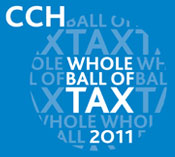| Home | About Us | Order Products | Press Center | Customer Service | Career Opportunities |

CCH can assist you with stories, including interviews with CCH subject experts.
Also, the 2011 CCH provides special CCH Tax Briefings on key topics at CCHGroup.com/Legislation.
|
Students, Educators Get Reprieve with Extension of Expiring Tax Deductions and Exclusions, But Fewer Credits(RIVERWOODS, ILL., January 2011) – Although it was set to expire after 2010, the American Opportunity Tax Credit (AOTC) was given a two-year extension late last year, while the Hope Credit remains officially suspended since the end of 2009, according to CCH, a Wolters Kluwer business and a leading provider of tax, accounting and audit information, software and services (CCHGroup.com). The Tax Relief, Unemployment Insurance Reauthorization and Job Creation Act of 2010 (2010 Tax Relief Act), which extended the AOTC, also brought back several education-related deductions and tax breaks set to expire after 2009 or 2010. “The 2010 Tax Relief Act provides parents and students now in school with some clarity on the tax breaks that will be available to them in the next few years,” said CCH Senior Federal Tax Analyst John W. Roth, JD, LLM. “However, people still need to educate themselves on the options and make sure they’re taking advantage of the resources that will best help them.” And, for the 2010 tax filing season, taxpayers claiming the tuition and fees or the teacher’s classroom expenses deductions will need to wait to file their returns until mid or late February. This is because the IRS has to update its systems to recognize these extensions passed in late 2010 as part of the Tax Relief Act. Education Credit Trio Becomes a DuoThe Hope Credit was modified in early 2009, creating the American Opportunity Tax Credit in addition to the Lifetime Learning Credit to offset the costs of higher education. Claiming one precludes a taxpayer from claiming the other in the same tax year.
“For 2009, the Hope Credit had been enhanced to assist taxpayers affected by the Midwest disasters, so some people may think that the old Hope credit was more beneficial,” said Roth. “However, in comparison to the regular Hope Credit and the Lifetime Learning Credit, the AOTC offers a larger credit with a refundable component and is available to taxpayers with a higher income for each of their college students in any of the first four years of college,” said Roth. “The Hope Credit was more limiting and the Lifetime Learning Credit is much more restrictive, available only one credit per return, not per student.” When a Larger Deduction Is Worth Less Than a Smaller Credit Taxpayers claiming either of the higher education tax credits are not allowed to also claim the above-the-line deduction for higher education tuition in the same year for the same student. The higher education deduction also was extended by the Tax Relief Act through 2011. It is a deduction of up to $4,000 if a taxpayer’s modified AGI is not greater than $65,000 for a single filer or $130,000 for joint filers; a deduction of up to $2,000 is available for taxpayers with modified AGI up to $80,000 for a single filer or $160,000 for joint filers. While it may appear that a $4,000 deduction would be more valuable than a $2,500 credit, a credit reduces a person’s tax liability dollar for dollar, whereas a deduction reduces taxes based on their tax bracket. As a result, a person in the 25-percent tax bracket would reduce their taxes by $1,000 through a $4,000 deduction, whereas a person taking a $2,500 credit would reduce their taxes by a full $2,500. In addition to the higher education tuition deduction, other above-the-line deductions extended through 2011 as part of the Tax Relief Act include the student loan interest deduction (up to $2,500) and the teacher’s classroom expense deduction (up to $250). Exclusions and ExemptionsThe 2010 Tax Relief Act also extends the educational assistance exclusion through 2012, allowing employees to exclude up to $5,250 in employer-provided education assistance annually from income and employment taxes. Additionally, taxpayers can make a tax-free contribution of up to $2,000 to a Coverdell Savings Account. (For more detail on education-related tax break qualifications and restrictions, see the charts in Release 26.) About CCH, a Wolters Kluwer businessCCH, a Wolters Kluwer business (CCHGroup.com) is a leading provider of tax, accounting and audit information, software and services. It has served tax, accounting and business professionals since 1913. CCH is based in Riverwoods, Ill. Wolters Kluwer is a leading global information services and publishing company. Wolters Kluwer is headquartered in Alphen aan den Rijn, the Netherlands (www.wolterskluwer.com). -- ### -- nb-11-22
|
© 2024, CCH INCORPORATED. All rights reserved. |
Back to Top | Print this Page | ||||||||||||||||||